No tattoo taboo
Source:Global Times Published: 2013-1-14 18:43:00
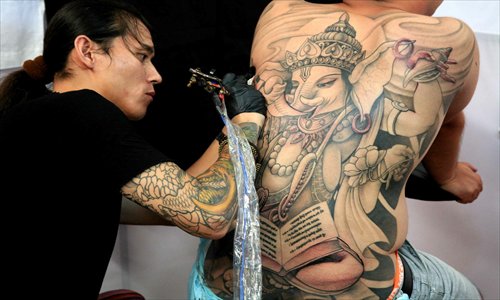
A tattoo artist practises at the China Tattoo Convention held in Shenyang, Liaoning Province, on August 5, 2011. Photo: CFP
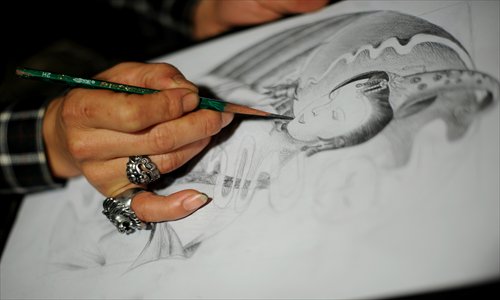
Liu Jinlong, a tattoo artist in Taiyuan, Shanxi Province, practises sketches. Photo: CFP
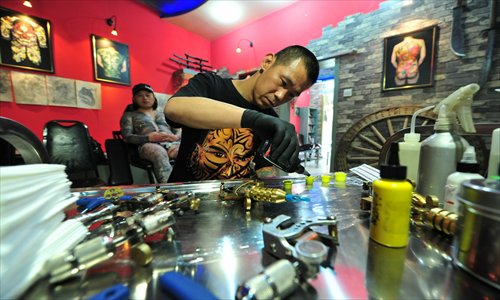
A tattoo artist from Taiyuan, Shanxi Province, mixes pigments in his shop. Photo: CFP
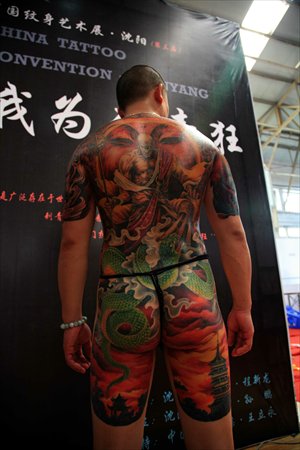
A model shows off his tattoos at an exhibition. Photo: CFP
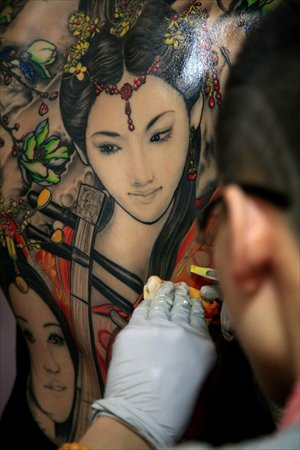
A tattoo artist shows off his skills at the China Tattoo Convention held in Shenyang, Liaoning Province, in 2011. Photo: CFP
Tattoos are no longer the taboo they once were in China. They are now becoming trendy among young people as a wealth of tattoo shops has sprung up. Despite booming prospects, experts worry about the transmission of disease due to unsanitary conditions and disputes caused by a lack of recognition or regulation of the trade.
"The government neither shows clear support nor opposes tattooing. We feel awkward and are less sure of ourselves as a result," Fu Hailin, director-general of the China Association of Tattoo Artists, told the Global Times on Sunday, noting that no official supervisory body or laws govern tattooing directly.
Tattoos used to be a traditional custom in China, with some ethnic groups having proud traditions in the art. But after the founding of New China, the art form was banned. As reform and opening-up started, the practice was secretly resumed. Nevertheless, many people, especially older citizens, still regard tattooed people as criminals and gangsters.
"Before, most customers were young and self-centered with a strong personality. But now, as the stereotypes fade away, more well-educated people come to us," said Fu, who opened a tattoo shop with a business license for body painting in Jinan, Shandong Province, in 2001, the first shop of its kind in the city.
Engaged in tattooing for over a decade, 39-year-old Fu has witnessed the industry's rapid development. In 2002, at a seminar he initiated for nationwide tattoo artists in Beijing, only 35 people were present. But in 2004, attendance was up tenfold, before topping 1,000 in 2008.
The number of tattoo shops has also risen sharply. In Beijing alone, near 2,000 exist. An internal statistic even puts the current tattoo artists in the country at 300,000, according to Fu, although it was not possible to verify this.
"But I can boldly say that 90 percent or more are not qualified," he said, adding that many tattoo artists lack health and safety awareness and use poor disinfection measures.
Inking a tattoo can cause infection or spread diseases, if done carelessly with inferior tools or materials.
To his relief, thanks to the advocating of professionals and voluntary organizations, the China Hairdressing & Beauty Association and the Ministry of Human Resources and Social Security jointly issued a work permit for tattoo artists at the end of last year, Fu said.
To qualify for the license, candidates have to sit an exam with questions concerning health and sterilization knowledge.
"But how the new rule will work, we still have to wait and see. As long as there's no punishment or little impact on their business if they work without the license, very few artists will pay nearly 4,000 yuan ($644) to get the permit," he said.
Global Times
"The government neither shows clear support nor opposes tattooing. We feel awkward and are less sure of ourselves as a result," Fu Hailin, director-general of the China Association of Tattoo Artists, told the Global Times on Sunday, noting that no official supervisory body or laws govern tattooing directly.
Tattoos used to be a traditional custom in China, with some ethnic groups having proud traditions in the art. But after the founding of New China, the art form was banned. As reform and opening-up started, the practice was secretly resumed. Nevertheless, many people, especially older citizens, still regard tattooed people as criminals and gangsters.
"Before, most customers were young and self-centered with a strong personality. But now, as the stereotypes fade away, more well-educated people come to us," said Fu, who opened a tattoo shop with a business license for body painting in Jinan, Shandong Province, in 2001, the first shop of its kind in the city.
Engaged in tattooing for over a decade, 39-year-old Fu has witnessed the industry's rapid development. In 2002, at a seminar he initiated for nationwide tattoo artists in Beijing, only 35 people were present. But in 2004, attendance was up tenfold, before topping 1,000 in 2008.
The number of tattoo shops has also risen sharply. In Beijing alone, near 2,000 exist. An internal statistic even puts the current tattoo artists in the country at 300,000, according to Fu, although it was not possible to verify this.
"But I can boldly say that 90 percent or more are not qualified," he said, adding that many tattoo artists lack health and safety awareness and use poor disinfection measures.
Inking a tattoo can cause infection or spread diseases, if done carelessly with inferior tools or materials.
To his relief, thanks to the advocating of professionals and voluntary organizations, the China Hairdressing & Beauty Association and the Ministry of Human Resources and Social Security jointly issued a work permit for tattoo artists at the end of last year, Fu said.
To qualify for the license, candidates have to sit an exam with questions concerning health and sterilization knowledge.
"But how the new rule will work, we still have to wait and see. As long as there's no punishment or little impact on their business if they work without the license, very few artists will pay nearly 4,000 yuan ($644) to get the permit," he said.
Global Times
Posted in: China, In-Depth